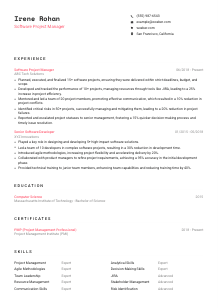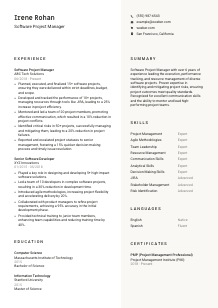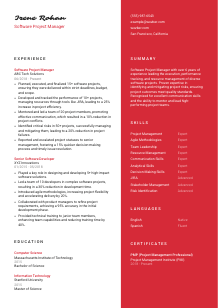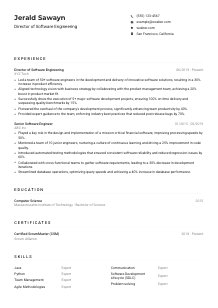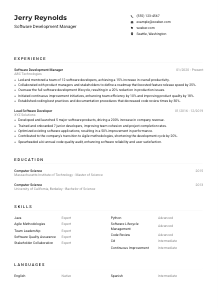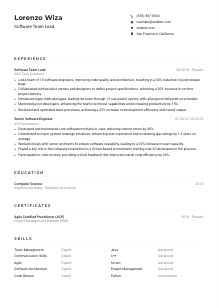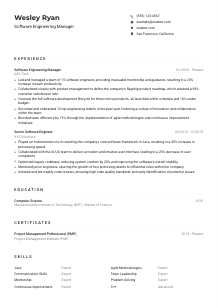Software Project Manager Resume Example
Juggling code and deadlines, but your resume's version control feels off? Browse this Software Project Manager resume example, formatted with Wozber free resume builder. It shows you how to flawlessly sync your software management prowess with job requisites, ensuring your career milestones are regularly committed to success!
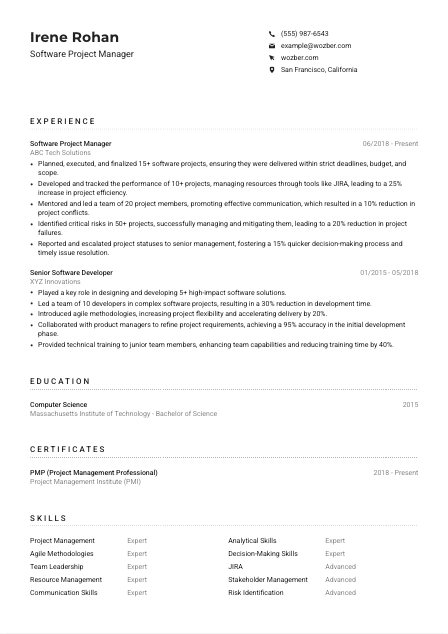
How to write a Software Project Manager Resume?
Stepping into the role of a Software Project Manager demands not just technical prowess but strategic foresight and stellar communication. In an evolving digital world, your resume is more than a document; it's the first release of your professional identity, and it needs to be bug-free and user-friendly. Let's dive into the art and science of crafting a resume that speaks directly to your strengths and aligns perfectly with the job description, using tools like Wozber's free resume builder and ATS resume scanner to ensure you're not just another candidate, but the candidate.
Personal Details
Even in a world driven by code and functionality, the personal touch remains invaluable. Your personal details section is your handshake in the digital realm. By perfectly aligning it with the specifics of the Software Project Manager position, you're already programming your way to success.
1. Boldly Brand Your Name
Your name is the header of your personal brand. Ensure it's prominent, perhaps through a slightly larger font that commands attention but remains within the parameters of professional decorum.
2. Tailor Your Title
Directly beneath your name, position your targeted role - "Software Project Manager" - which serves not only as a reaffirmation of your aspirations but also matches the job description verbatim, optimizing for ATS keywords.
3. Make Contact Info Precise
A clutter-free approach wins. Include your email (in a professional format), phone number (ensure accuracy), and perhaps your LinkedIn or GitHub profiles, especially relevant for a tech-centric role, showcasing a well-maintained online presence.
4. Location, Location, Location
"Must be located in San Francisco, California." If you are, stating this upfront aligns with the geographical prerequisite, potentially placing you a step ahead of distant contenders.
5. Omit the Superfluous
Age, marital status, or photos can be left out. Your aim is to be seen as a skillful navigator of software projects, not to provide a biographic snapshot. This keeps the focus on your professional capabilities and avoids unconscious biases.
Takeaway
Imagine your personal details as your app's UI: it needs to be clean, user-friendly, and informative. Get this right, and you've gracefully cleared the first hurdle in capturing the hiring manager's attention.





Experience
In the codebase of your career, the Experience section holds the core functionalities that drive your professional narrative. Here, each role you've played builds upon the previous ones, showing your growth and adaptation in the software project management domain.
- Planned, executed, and finalized 15+ software projects, ensuring they were delivered within strict deadlines, budget, and scope.
- Developed and tracked the performance of 10+ projects, managing resources through tools like JIRA, leading to a 25% increase in project efficiency.
- Mentored and led a team of 20 project members, promoting effective communication, which resulted in a 10% reduction in project conflicts.
- Identified critical risks in 50+ projects, successfully managing and mitigating them, leading to a 20% reduction in project failures.
- Reported and escalated project statuses to senior management, fostering a 15% quicker decision‑making process and timely issue resolution.
- Played a key role in designing and developing 5+ high‑impact software solutions.
- Led a team of 10 developers in complex software projects, resulting in a 30% reduction in development time.
- Introduced agile methodologies, increasing project flexibility and accelerating delivery by 20%.
- Collaborated with product managers to refine project requirements, achieving a 95% accuracy in the initial development phase.
- Provided technical training to junior team members, enhancing team capabilities and reducing training time by 40%.
1. Dissect the Job Requirements
Before you start writing, analyze the job description. Note the specifics, such as "Planned, executed, and finalized software projects," and "Led and mentored project team members." These phrases are your keywords for ATS optimization.
2. Chronological Order & Details
List your positions starting from the most recent one. Include company names, your roles, and the time frame. This structure gives the hiring manager a clear timeline of your journey.
3. Craft Accomplishments, Not Tasks
"Developed and tracked the performance of 10+ projects..." showcases not just action but results. Highlight achievements over duties, and where possible, quantify your success, enhancing the readability and impact.
4. Quantify Your Impact
Numbers talk. When you mention a "25% increase in project efficiency" or a "20% reduction in project failures," you provide concrete evidence of your contributions, making your capabilities tangible to the recruiter.
5. Relevance is Key
Your stint as a software developer is as crucial as your management experience because it showcases your technical foundation. Ensure that every point directly contributes to painting a comprehensive picture of you as the ideal Software Project Manager.
Takeaway
Like a successfully executed project, your experience section should be concise, impactful, and reflective of your journey toward becoming an exceptional Software Project Manager. Let your professional backdrop inspire confidence.
Education
Every great build starts with a solid foundation. Your education is the bedrock of your professional competencies, offering indisputable proof of your academic prowess and dedication to your field.
1. Pinpoint Essential Education
"Bachelor's degree in Computer Science, Information Technology, or a related field." Explicitly state your degree to match this requirement, ensuring your resume passes both the human and ATS scans.
2. Structure with Care
For a clean, ATS-friendly format, list your degree(s), the name of the institution, and your graduation year. This straightforward approach helps ATS software easily locate and interpret your educational background.
3. Align Degrees with Job Needs
If you have more than one relevant degree, like both a Bachelor's and a Master's in fields directly aligned with the job description, make sure to list both. This not only shows your commitment to your education but also your extensive grounding in the subject matter.
4. Relevant Courses and Achievements
Though it wasn't necessary for our example, including pertinent courses or milestones can bolster your position, especially if they directly relate to software project management or highlight leadership and strategic thinking skills.
5. Continuous Learning
The tech field evolves rapidly. Mentioning any ongoing education, workshops, or seminars you've attended not only demonstrates your commitment to staying current but also your proactive approach to professional growth.
Takeaway
Your education section should echo the requirements of the role while showcasing your qualifications. It's a testament to your commitment to your career in software project management and a cornerstone of your resume's structure.
Certificates
In the world of software project management, certificates are like achievements unlocked. They validate your expertise and dedication to your craft, proving that you're not just competent but competitively exceptional.
1. Highlight Key Certificates
The job description's preference for a "PMP (Project Management Professional) certification" is a clarion call. If you have it, it's a must-include. This certification speaks volumes about your understanding of international project management standards.
2. Quality Over Quantity
List certificates that are most relevant to the job description. Your aim is to showcase your most pertinent credentials upfront, ensuring they align with the role's requirements and resonate with the hiring manager.
3. Date and Validity
Ensure to include the acquisition or validity dates of your certifications, particularly if they're recent. This information can underscore your continuous professional development and commitment to staying atop industry trends.
4. Stay Proactively Certified
The tech landscape is perpetually in flux. Continuously seek out certifications that not only bolster your current skill set but also anticipate future industry demands, keeping you a step ahead and your resume always in contention.
Takeaway
Think of your Certificates section as your professional trophy case. Display your most prestigious awards and achievements upfront, ensuring they're directly relevant to your Software Project Manager aspirations. Be proud and make sure they're visible.
Skills
For a Software Project Manager, the Skills section is where you get to showcase your comprehensive toolkit - from project management software to leadership qualities. Here, every skill you list is a tile in the mosaic of your professional identity.
1. Decode the Job Listing
Isolate both the explicit skills like "Proficiency with project management software" and implicit ones such as leadership or problem-solving abilities from the job description. These keywords are crucial for making your resume ATS-compliant.
2. Match and Showcase
Demonstrate your arsenal. If you're proficient in JIRA, say so. If your leadership led to a reduction in project conflicts, highlight it. The more your skills mirror the job requirements, the more compelling your application.
3. Organize and Prioritize
Keep the section neat. Start with the hard skills closely tied to the job specs, followed by the soft skills that make you an exemplary leader and manager. This structured approach ensures clarity and facilitates an easier scan by ATS software.
Takeaway
In the landscape of software project management, your skills are your most potent tools. Make them count. Highlight, prioritize, and keep them relevant. Let your Skills section be a testament to your capability to lead, manage, and inspire.
Languages
In a role that often necessitates clear, concise, and effective communication across diverse teams, showcasing your linguistic prowess can set you apart in a sea of applicants. In the context of Software Project Management, it marks you as a leader with a global perspective.
1. Match Job Specification
"High level English communication skills are a must." If you're a native or fluent English speaker, make this prominently known. It directly addresses a key job requirement, making your resume more relevant and appealing.
2. Showcase Additional Languages
Any additional languages you speak can be a bonus, indicating your ability to navigate multicultural environments or manage projects internationally. This is an asset in the global market of software development and management.
3. Honest Proficiency Levels
Accuracy in presenting your language skills is essential. Whether you're 'Fluent,' 'Intermediate,' or 'Basic,' being honest about your language proficiency prevents misunderstandings and sets clear expectations.
4. Tailor to the Role's Needs
While English suffices for most software project management roles, understanding the specific requirements and preferences of the company you're applying to can guide which languages to highlight and how.
5. Consider the Role's Reach
For positions that might have an international scope or involve coordinating with teams overseas, showcasing multiple language proficiencies can be particularly advantageous, demonstrating your preparedness for a global stage.
Takeaway
Languages are more than a means of communication; they're a bridge to understanding diverse perspectives and managing across cultures. Flaunt your linguistic skills as part of your broader toolkit for managing software projects on a global scale.
Summary
Your summary is the executive summary of your professional persona. Here, in a few succinct lines, you capture the essence of your capabilities, experiences, and ambitions, tailor-made for the Software Project Manager role. It's where you set the tone for everything that follows.
1. Capture the Job's Essence
Review the job description a final time. Identify key phrases that resonate with your expertise. Phrases like "leading the execution" or "ensuring project outcomes meet quality standards" should be mirrored here, signaling a direct correlation between your capabilities and the job requirements.
2. Start with a Strong Introduction
Open with a compelling statement that encapsulates your professional identity. "Software Project Manager with over 6 years of experience" instantly establishes your footing in the field, providing a solid intro to your career narrative.
3. Blend Skills and Achievements
Integrate your technical mastery and leadership triumphs. Mentioning that you've "led a team of 20 project members" or "managed resources through tools like JIRA" offers a concise overview of your managerial and technical competencies, engaging the reader's interest.
4. Conciseness is Your Friend
The beauty of your summary lies in its brevity. Aim for 3-5 lines that encapsulate your professional ethos without overwhelming the reader. This is your pitch; make every word count towards portraying you as the ideal candidate for the Software Project Manager role.
Takeaway
View your summary as the portal to your professional story. Craft it with precision, making it reflective of your journey and aspirations as a Software Project Manager. This is your chance to intrigue and convince. Make it impactful, make it resonate.
Launching Your Software Project Manager Journey
Congratulations on completing this deep dive into crafting a targeted resume for the Software Project Manager role. With strategic insights and Wozber's arsenal at your disposal, including the free resume builder and ATS resume scanner, you're now equipped to create an ATS-compliant resume that not only ticks all the boxes but also tells a compelling story of your professional journey. Your next chapter is poised to begin.
Use these insights, tailor your resume, and step forward with confidence. The world of software project management awaits your expertise.

- Bachelor's degree in Computer Science, Information Technology, or a related field.
- A minimum of 5 years of experience in software project management or relevant roles.
- Strong proficiency with project management software tools, methodologies, and best practices.
- Excellent analytical, problem-solving, and decision-making skills.
- PMP (Project Management Professional) certification is preferred.
- High level English communication skills are a must.
- Must be located in San Francisco, California.
- Plan, execute, and finalize software projects according to strict deadlines, budget, and scope.
- Develop and track project performance, schedule, and resources using appropriate systems, tools, and techniques.
- Lead and mentor project team members, ensuring effective communication, collaboration, and motivation.
- Identify, manage, and mitigate risks, ensuring project outcomes meet quality standards.
- Report and escalate project status and issues to senior management as needed.





